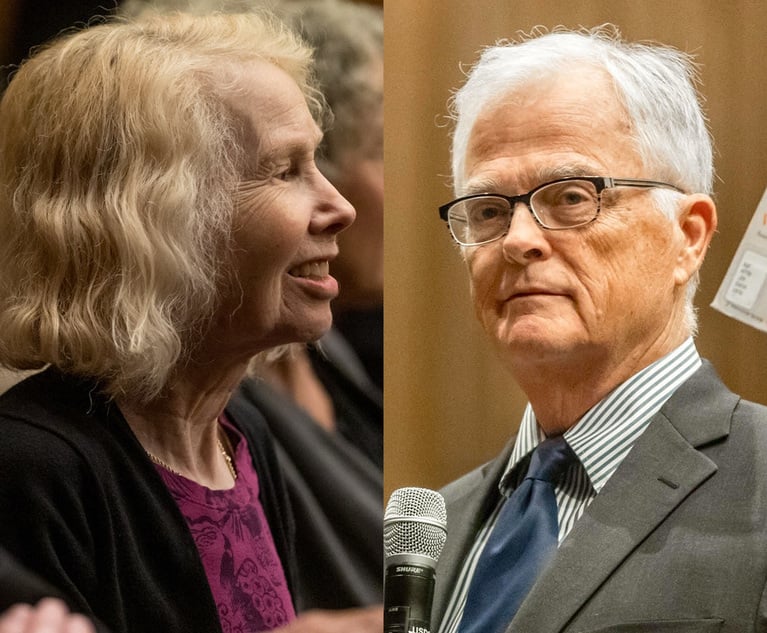Rimini Liable for Copyright Infringement Against Oracle but Not Computer Crimes, 9th Circuit Rules
The U.S. Court of Appeals for the Ninth Circuit on Monday lopped a sizable chunk out of Oracle Corp.'s $124 million copyright and computer crime judgment against software support provider Rimini Street Inc.
January 08, 2018 at 06:52 PM
3 minute read
 Oracle's headquarters in Redwood City, California.
Oracle's headquarters in Redwood City, California.
The U.S. Court of Appeals for the Ninth Circuit on Monday lopped a sizable chunk out of Oracle Corp.'s $124 million copyright and computer crime judgment against software support provider Rimini Street Inc.
But the Ninth Circuit affirmed the core $58 million award for copyright infringement and prejudgment interest. The court, which heard arguments in July from two top appellate advocates, ruled in Oracle v. Rimini Street that Rimini Street's copying wasn't covered by licenses Oracle had granted to companies such as Siebel, JD Edwards, PeopleSoft and Database for whom Rimini Street provided testing, support and updates.
Gibson, Dunn & Crutcher partner Mark Perry had argued on appeal that Rimini had copied software to create software development environments under the authorized license of one customer and then “cross-used” it for other licensed customers.
But Oracle, represented by Kirkland & Ellis partner Paul Clement, persuaded the panel that any copying could only support the individual licensee. “The licensees may hire a third party such as Rimini to maintain their software for them, but nothing in the licenses permits them to grant a nonparty to the license a general right to copy proprietary software,” U.S. District Judge Jeremy Fogel of the Northern District of California, sitting by designation at the Ninth Circuit, wrote for the unanimous panel.
The news was better for Rimini Street and CEO Seth Ravin on claims related to California's Comprehensive Computer Data Access and Fraud Act and the Nevada Computer Crimes Law. Rimini Street had been using automated downloading tools to obtain customer support files. That prompted Oracle to change its terms of use to prohibit the use of robots, spiders and scrapers. Rimini stopped using them for about a year, then resumed the practice, downloading hundreds of thousands of files including full support libraries, according to Fogel's opinion.
Rimini argued that it was legally authorized to access the files, and that it was not a crime to do so simply due to the automated manner that Oracle found objectionable.
Fogel agreed. “We hold that taking data using a method prohibited by the applicable terms of use, when the taking itself generally is permitted, does not violate” the California or Nevada computer crime laws, he wrote.
Judges Susan Graber and Michelle Friedland concurred.
Oracle spokeswoman Deborah Hellinger said the company was pleased with the decision. “Copyright infringement is at the core of Oracle's dispute with Rimini, and the court of appeals affirmed all of the trial court's and the jury's findings that Rimini blatantly violated copyright law,” Hellinger said.
The upshot is that the decision knocked $20 million off the award for violation of the computer statutes and related Unfair Competition Law claims. The court also reduced taxable costs by $1.5 million.
The panel further instructed U.S. District Judge Larry Hicks of the the District of Nevada to reconsider the $28.5 million attorney fee award and injunction in light of the elimination of the computer crime portion of the judgment. The court explicitly instructed that Rimini CEO Ravin will no longer be jointly and severally liable for attorney fees.
This content has been archived. It is available through our partners, LexisNexis® and Bloomberg Law.
To view this content, please continue to their sites.
Not a Lexis Subscriber?
Subscribe Now
Not a Bloomberg Law Subscriber?
Subscribe Now
NOT FOR REPRINT
© 2024 ALM Global, LLC, All Rights Reserved. Request academic re-use from www.copyright.com. All other uses, submit a request to [email protected]. For more information visit Asset & Logo Licensing.
You Might Like
View All
Two Judges. 60-Plus Years on the Bench. Plenty of Advice.

NLRB Bans 'Captive Audience' Meetings, Yanking Away Platform Employers Used to Combat Unionizing


Judge Rejects Meta’s Plea to Send FTC Antitrust Suit to Trash Heap
Trending Stories
- 1'I've Worked Until 2 in the Morning': Lawyers Brace for Trump Policy
- 2Trial Begins for Man Accused of Killing Ga. Nursing Student Laken Riley
- 3'It's Not About Speed': Forging Strong Legal Department-Law Firm Relationships Starts With Humility, Trust
- 4Benworth Accused of Predatory Tactics in Foreclosure Dispute as Elderly Defendant's Health Deteriorates
- 5Tom Girardi's Lawyers Want Next Month's Sentencing Delayed
Who Got The Work
Michael G. Bongiorno, Andrew Scott Dulberg and Elizabeth E. Driscoll from Wilmer Cutler Pickering Hale and Dorr have stepped in to represent Symbotic Inc., an A.I.-enabled technology platform that focuses on increasing supply chain efficiency, and other defendants in a pending shareholder derivative lawsuit. The case, filed Oct. 2 in Massachusetts District Court by the Brown Law Firm on behalf of Stephen Austen, accuses certain officers and directors of misleading investors in regard to Symbotic's potential for margin growth by failing to disclose that the company was not equipped to timely deploy its systems or manage expenses through project delays. The case, assigned to U.S. District Judge Nathaniel M. Gorton, is 1:24-cv-12522, Austen v. Cohen et al.
Who Got The Work
Edmund Polubinski and Marie Killmond of Davis Polk & Wardwell have entered appearances for data platform software development company MongoDB and other defendants in a pending shareholder derivative lawsuit. The action, filed Oct. 7 in New York Southern District Court by the Brown Law Firm, accuses the company's directors and/or officers of falsely expressing confidence in the company’s restructuring of its sales incentive plan and downplaying the severity of decreases in its upfront commitments. The case is 1:24-cv-07594, Roy v. Ittycheria et al.
Who Got The Work
Amy O. Bruchs and Kurt F. Ellison of Michael Best & Friedrich have entered appearances for Epic Systems Corp. in a pending employment discrimination lawsuit. The suit was filed Sept. 7 in Wisconsin Western District Court by Levine Eisberner LLC and Siri & Glimstad on behalf of a project manager who claims that he was wrongfully terminated after applying for a religious exemption to the defendant's COVID-19 vaccine mandate. The case, assigned to U.S. Magistrate Judge Anita Marie Boor, is 3:24-cv-00630, Secker, Nathan v. Epic Systems Corporation.
Who Got The Work
David X. Sullivan, Thomas J. Finn and Gregory A. Hall from McCarter & English have entered appearances for Sunrun Installation Services in a pending civil rights lawsuit. The complaint was filed Sept. 4 in Connecticut District Court by attorney Robert M. Berke on behalf of former employee George Edward Steins, who was arrested and charged with employing an unregistered home improvement salesperson. The complaint alleges that had Sunrun informed the Connecticut Department of Consumer Protection that the plaintiff's employment had ended in 2017 and that he no longer held Sunrun's home improvement contractor license, he would not have been hit with charges, which were dismissed in May 2024. The case, assigned to U.S. District Judge Jeffrey A. Meyer, is 3:24-cv-01423, Steins v. Sunrun, Inc. et al.
Who Got The Work
Greenberg Traurig shareholder Joshua L. Raskin has entered an appearance for boohoo.com UK Ltd. in a pending patent infringement lawsuit. The suit, filed Sept. 3 in Texas Eastern District Court by Rozier Hardt McDonough on behalf of Alto Dynamics, asserts five patents related to an online shopping platform. The case, assigned to U.S. District Judge Rodney Gilstrap, is 2:24-cv-00719, Alto Dynamics, LLC v. boohoo.com UK Limited.
Featured Firms
Law Offices of Gary Martin Hays & Associates, P.C.
(470) 294-1674
Law Offices of Mark E. Salomone
(857) 444-6468
Smith & Hassler
(713) 739-1250







